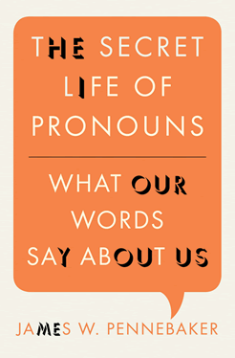“The Secret Life of Pronouns” by James W. Pennebaker is a book I wish I’d read before finishing my thesis. It makes a strong case for words having the power to reflect changes in our society and perhaps even be transformative. Sometimes highly relevant work is just too many disciplines away from your research area for it to register. (I felt the same way on discovering the work that Joanna J. Bryson was doing in the AI and philosophy areas on robot ethics and robots as slaves.)
Why was this relevant to me? My thesis was that analyzing the names we gave robots, particularly research robots in competitions rather than consumer products, illustrated the underlying social relations we have with robots and my conclusion was that we treat robots as slaves based on robot names having most similarity to 18th century slave names, rather than pet names, gadget names or personal names. My background is cultural theory, which analyzes objects and relations as texts and communications.
James W. Pennebaker is a social psychologist, the Regents Centennial Liberal Arts Professor and Chair of the Department of Psychology at the University of Texas at Austin, and highly cited author of 10 books and almost 300 scientific articles. The Secret Life of Pronouns describes a large long term research project that connects the way we use small functional words with the way we behave and are positioned in the world, our ‘social and psychological processes’.
“The smallest, most commonly used, most forgettable words serve as windows into our thoughts, emotions, and behaviors. The ways people use pronouns, articles, and other everyday words are linked to their personality, honesty, social skills, and intentions…. Using computerized text analyses on hundreds of thousands of letters, poems, books, blogs, Tweets, conversations, and other texts, it is possible to begin to read people’s hearts and minds in ways they can’t do themselves.”
The Secret Life of Pronouns is one of the new breed of big data scientific research projects. Using computation power and masses of data, the researchers are able to transform subtle social differences into significant correlations and robust data sets. We still argue over whether or not gender or class exist, or more precisely, we usually agree that they exist but risk being labelled polemical when we attempt to label something as gender or class related. So many other factors are more overt and specific to the group/people.
While there is always a trade off between large scale quantitative research and in depth qualitative work, it is very compelling to be able to say that something was studied over millions of people or thousands of cities. If a finding is true across all of these diverse groups then we may start to see the real nature of gender, class and other culturally constructed identities. We might be able to see if things change, in which ways and whether or not changes are beneficial, although that is still a highly subjective measure!
Some of Pennebaker’s findings include that women and men really do use language differently, and that most authors can be identified as male or female regardless of their characters’ genders. Even author authenticity has a good chance of being detected, whether Beatles songs or the Federalist papers. How couples or groups relate to each other shows in word use mirroring and can predict longevity of relationships and productivity of work teams. Ultimately, social cohesion is reflected in language styles, which like accents, can be highly localized and a subtle indicator of status and group belonging. People seem to be very good at utilizing these communicative techniques without thinking about it.
“The magic of this project is not about the links between income distributions and social patterns in cities. Rather, it shows how words in the most mundane of places can reveal important information about a community’s social ties. All groups, whether families, work groups, companies, or entire cities, leave trails of their social and psychological lives behind in the words their members use in communicating with each other. Words are one of the human-made elements that connect our thoughts and ideas across people. By tracking our words, we get a sense of the social fabric.” [p.243 'The Secret Life of Pronouns' by Pennebaker, J. W. Bloomsbury Press NY 2011]
Like this:
Be the first to like this post.
Monday, March 19, 2012
Secret Life of Pronouns | The Robot State
Subscribe to:
Post Comments (Atom)

No comments:
Post a Comment